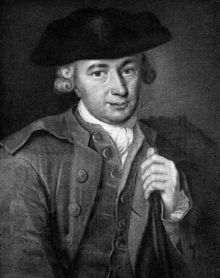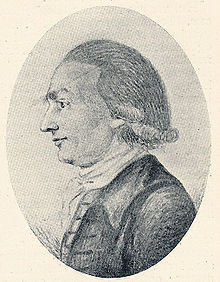- Johann Georg Hamann
-
Johann Georg Hamann (August 27, 1730, Königsberg – June 21, 1788, Münster) was a noted German philosopher, a main proponent of the Sturm und Drang movement, and associated by historian of ideas Isaiah Berlin with the Counter-Enlightenment.
Contents
Biography
He was destined for the pulpit, but became a clerk in a mercantile house, and afterward held many small public offices, devoting his leisure to study. He wrote under the nom de plume of “the Magus of the North” (German: Magus im Norden).
Philosophical arguments
His distrust of reason and the Enlightenment (“I look upon logical proofs the way a well-bred girl looks upon a love letter” was one of his many witticisms) led him to conclude that faith in God was the only solution to the vexing problems of philosophy.
Influences on Hamann
Hamann was a Pietist Lutheran, and a friend (while being an intellectual opponent) of the philosopher Immanuel Kant. He was greatly influenced by David Hume. This is most evident in Hamann's conviction that faith and belief, rather than knowledge, determine human actions. Also, Hamann asserted that the efficacy of a concept arises from the habits it reflects rather than any inherent quality it possesses. Hamann famously used the image of Socrates, who often proclaimed to know nothing, in his Socratic Memorabilia, an essay in which Hamann critiques the Enlightenment's dependence on reason.
Hamann's influence
Hamann was one of the precipitating forces for the counter-enlightenment. He was, moreover, a mentor to Herder and an admired influence on Goethe, Jacobi, Hegel, Kierkegaard, Lessing and Mendelssohn. Hans Urs von Balthasar devoted a chapter to Hamann in his volume, Studies in Theological Styles: Lay Styles (Volume III in the English language translation of The Glory of the Lord series).
The character of Hamann's writing
Hamann's writings consist of small essays. They display two striking tendencies. The first is their brevity, in comparison with works by his contemporaries. The second is their breadth of allusion and delight in extended analogies. For example, his work Golgatha and Scheblimini! By a Preacher in the Wilderness (1784) was directed against Moses Mendelssohn's Jerusalem, or on Religious Might and Judaism (1782). His work was also significantly reactive and reparative: rather than advance a “position” of his own, his principal mode of thinking was to respond to others' work.
Music
Hamann was a lutenist, having studied this instrument with Timofey Belogradsky (a student of Sylvius Leopold Weiss), a Ukrainian virtuoso then living in Königsberg.
Editions
Fragments of his writings were published by Cramer, under the title of Sibyllinische Blätter des Magus aus Norden (1819), and a complete edition by Roth (7 vols., 1821-25, with a volume of additions and explanations by Wiener, 1843). Hamann's des Magus in Norden Leben und Schriften, edited by Gildemeister, was published in 5 vols., 1857-68, and a new edition of his Schriften und Briefen, edited by Petri, in 4 vols., 1872-74.
Further reading
- W.M. Alexander, Johann Georg Hamann: Philosophy and Faith; (The Hague) 1966
- Frederick Beiser, The fate of reason: German philosophy from Kant to Fichte; (Cambridge Mass.: Harvard University Press) 1987 ISBN 0674295021
- Betz, John, After Enlightenment: The Post-Secular Vision of J.G. Hamann (Oxford: Wiley Blackwell) 2009, ISBN 9781405162463
- Robert Alan Sparling, Johann Georg Hamann and the Enlightenment Project; (Toronto: University of Toronto Press) 2011, ISBN 9781442642157
References
- Isaiah Berlin, Three Critics of the Enlightenment: Vico, Hamann, Herder; (London and Princeton), 2000, ISBN 0691057265
- Dickson, Gwen Griffith, Johann Georg Hamann's Relational Metacriticism (contains English translations of Socratic Memorabilia, Aesthetica in Nuce, a selection of essays on language, Essay of a Sibyl on Marriage and Metacritique of the Purism of Reason); (Walter de Gruyter), 1995. ISBN 3110144379
- Kenneth Haynes (ed.), Hamann: Writings on Philosophy and Language (Cambridge Texts in the History of Philosophy); (Cambridge University Press), 2007, ISBN 9780521817417
- James C. O'Flaherty, Unity and Language: A Study in the Philosophy of Hamann; (University of North Carolina), 1952;
- James C. O'Flaherty, Hamann's Socratic Memorabilia: A Translation and Commentary; (Johns Hopkins Press), 1967; Library of Congress Catalog Card No. 67-12424;
- James C. O'Flaherty, Johann Georg Hamann; (Twayne Publishers), 1979, ISBN 0805763716;
- James C. O'Flaherty, The Quarrel of Reason with Itself: Essays on Hamann, Michaelis, Lessing, Nietzsche; (Camden House) 1988, ISBN 0938100564
 This article incorporates text from a publication now in the public domain: "Hamann, Johann Georg". The American Cyclopædia. 1879.
This article incorporates text from a publication now in the public domain: "Hamann, Johann Georg". The American Cyclopædia. 1879.
External links
- Johann Georg Hamann entry in the Stanford Encyclopedia of Philosophy
- Notes on international conference on Hamann in March 2009
- Hamann Briefe Letters
Categories:- 1730 births
- 1788 deaths
- 18th-century philosophers
- German lutenists
- German Lutherans
- German philosophers
- Hermeneutics
- People from East Prussia
- People from Kaliningrad
- People from Königsberg
Wikimedia Foundation. 2010.


